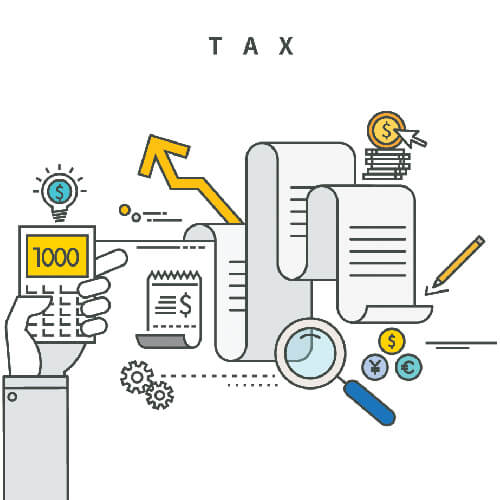As the saying goes, death and taxes are the only two certain things in life. For real estate investors and owners, taxes are an unavoidable part of life. In addition, tax code changes are also inevitable. Under the Tax Cuts and Jobs Act, commercial real estate owners and investors have several new options. Here, we’re examining the TCJA and Texas tax code.
The Tax Cuts and Jobs Act
A commercial real estate investment broker is expected to stay on top of all 2020 tax code changes to best advise their clients. However, if you own a Houston commercial real estate investment, you should also stay current on tax laws and code changes. Not being aware of tax code changes could hurt you in the long run. You should know both federal and Texas tax code changes to ensure you don’t get caught unaware.
The Tax Cuts and Jobs Act: Impact on Commercial Real Estate
 Following the federal tax cuts and reforms signed into law in late 2017 (The Tax Cuts and Jobs Act or TCJA), a few things changed for commercial real estate. Most of the law’s provisions went into effect on January 1, 2018. Below, you’ll find a few of the Tax Cuts and Jobs Act changes that directly impact commercial real investors and property owners.
Following the federal tax cuts and reforms signed into law in late 2017 (The Tax Cuts and Jobs Act or TCJA), a few things changed for commercial real estate. Most of the law’s provisions went into effect on January 1, 2018. Below, you’ll find a few of the Tax Cuts and Jobs Act changes that directly impact commercial real investors and property owners.
The Alternative Minimum Tax (AMT)
Before the Tax Cuts and Jobs Act, millions of Americans paid AMT every year. This tax was once intended only for the super-wealthy, but it remained in the tac code over the decades, leading to more Americans than ever paying this unnecessary tax. After the TCJA passed, the AMT nearly disappeared. Instead of more than 5 million people paying AMT, now just 200,000 or so will now pay this tax.
Business Interest Expense Limitation
The TCJA allows disallowed business interest to be carried forward indefinitely. Business interest — “any interest paid or accrued on indebtedness “properly allocable to a trade or business” but does not include “investment interest” (as defined in Code Section 163(d)).”
Carried Interest
Carried interest refers to additional profits earned by fund managers if that fund performs better than expected. Despite President Trump’s initial promise to eliminate this carried interest loophole, the final version of the Tax Cuts and Jobs Act only made minor changes to this process. Investors must now hold assets for three years instead of one year to qualify for lower capital gains tax rate on carried interest.
Depreciation/ MACRS (The Modified Accelerated Cost Recovery System)
The Modified Accelerated Cost Recovery System, or MACRS, allows commercial property owners to accelerate depreciation on their assets. You can find more detailed information about this process under the Tax Cuts and Jobs Act in this article.
The new tax code sets longer depreciation schedules under MACRS:
- 40 years for nonresidential property
- 30 years for residential rental property
- 20 years for qualified interior improvements.

Consequently, these longer schedules could potentially have a negative impact on ROI.
Lower Corporate Tax Rate
One of the most significant impacts of the Tax Cuts and Jobs Act of 2017 was the corporate tax rate adjustment. The TCJA lowered the corporate tax rate to a flat 21% across the board. Large corporate real estate companies (such as REITs) will benefit drastically from this tax cut.
REITs
A Real Estate Investment Trust is any company or corporation that owns, operates, or finances income-producing real estate. In order to qualify as a REIT, a company needs to meet certain guidelines. Generally, REITs often trade on major exchanges. In addition, they offer investors a cash stake in commercial real estate.
The new tax laws under the TCJA are favorable towards REITs. Lower corporate taxes are one major benefit for these corporate taxpayers. In some cases, REITs also benefit from the pass-through deduction and the MACRS depreciation schedule.
Opportunity Zones
Investors now have new tax incentives for investing in qualified Opportunity Zones. Intended to encourage investment in targeted low-income, economically distressed communities, this provision allows temporary deferral of capital gains income. View our special section on Opportunity Zones for Commercial Real Estate Investors in Texas.
Stay Up-to-date On Tax Code Changes
 As a commercial real estate investor, it is important to stay up-to-date on new tax code changes. After all, no one wants to be penalized because of ignorance. No one wants to miss out on tax benefits either. Here at Lumicre, we work hard to make sure commercial real estate investors understand Texas tax code in addition to national tax consideration.
As a commercial real estate investor, it is important to stay up-to-date on new tax code changes. After all, no one wants to be penalized because of ignorance. No one wants to miss out on tax benefits either. Here at Lumicre, we work hard to make sure commercial real estate investors understand Texas tax code in addition to national tax consideration.
The changes under the Tax Cuts and Jobs Act have changed the landscape for commercial investing. Make sure you understand these changes. Contact us today to learn more about your options.
Further Reading
Proskauer — The Effects of the Tax Cuts and Jobs Act on Real Estate
CohnReznick — A Review of the Tax Cuts and Jobs Act — Commercial Real Estate